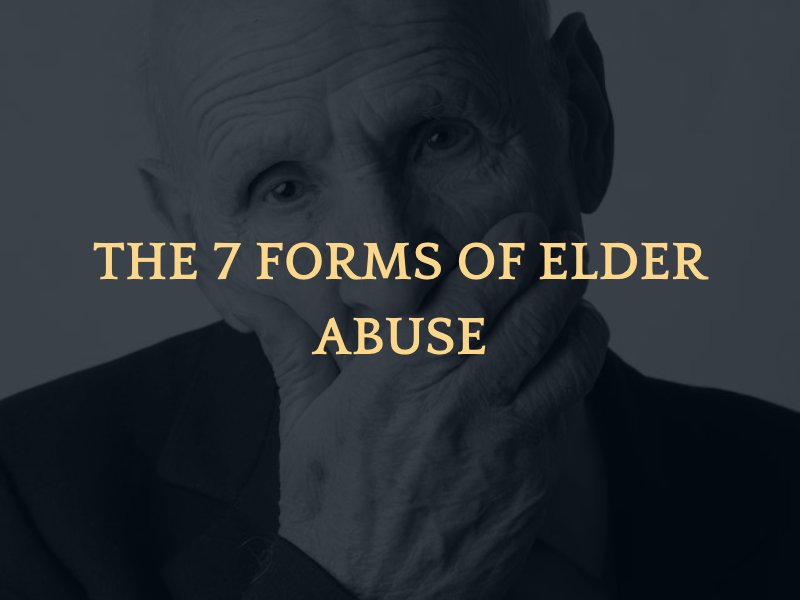
Our aging loved ones are entitled to more than just the basics of care, they also deserve compassion and respect for their human dignity. Nursing home caregivers and others who care for the elderly have the duty to provide diligent care, humane treatment, and respect for the individual’s feelings and sense of well-being.
During their declining years, aging citizens become vulnerable to abuse. According to the National Council on Aging, one in ten elderly Americans suffer some form of abuse, or over five million elderly citizens each year. What are the seven most common forms of elder abuse, and how do family members recognize the signs that an elderly loved one has suffered abuse?
1. Neglect
Neglect is by far the most common form of elder abuse. Disregarding basic care for an elderly person whose physical or cognitive condition makes it impossible for them to care for themselves is neglect. The most common forms of elder neglect include failing to provide adequate hydration and nutrition, failure to treat illnesses and infections such as bedsores or UTIs, failure to provide necessary medical care and medications, and neglecting hygiene.
2. Physical Abuse
Physical abuse against an elderly person who isn’t capable of self-defense or reporting abuse is an egregious action that occurs in private homes and nursing homes. Physical abuse includes hitting, kicking, pinching, pushing, or wrongfully restraining an elderly person. Physical abuse may occur from a caregiver or another resident in a nursing home.
3. Emotional Abuse
Emotional abuse can be nearly as deadly to an elderly person as physical abuse. An elderly victim of emotional abuse may enter a physical and cognitive decline as a result of demoralizing abuse. Emotional abuse against the elderly includes yelling, threatening, belittling, intimidating, ridiculing, insulting, or humiliating the individual.
4. Sexual Abuse
Sexual abuse occurs when a caregiver, resident, or other individual makes sexual contact or penetrates an elderly victim who is physically and/or cognitively unable to deter the contact or report the abuse. Sexual abuse against the elderly is underreported due to the feelings of shame experienced by victims.
5. Financial Abuse
The elderly are often prey to those seeking to exploit them for financial gain. Because elderly individuals are often vulnerable to scams or cognitively unable to report financial exploitation, they become targets for financial abuse. Financial abuse of the elderly comes in many forms, including phone scams, intercepting checks, accessing bank accounts, or befriending an elderly person and then using their home, car, and money.
6. Abandonment
Abandonment of the elderly occurs in private homes and nursing homes. Abandonment occurs when a caregiver leaves an elderly person alone for extended periods of time either by failing to come to their room to deliver care or by restraining the elderly person in a bed or chair. Abandonment also occurs when a family member or caregiver dumps an elderly person in a public or private place and deserts them.
7. Self-Neglect
Self-neglect of the elderly occurs when an aging citizen fails to provide themselves with adequate food, hydration, hygiene, and medical care. This happens due to physical or cognitive decline, or due to loneliness or loss of the will to live.
Recognizing Signs of Elder Abuse
Elder abuse takes a toll on the vulnerable elderly. Some signs of abuse might be mistaken for the natural signs of aging, but it’s important to recognize elder abuse in an aging person who may be unable or unwilling to report their abuse. Common signs of elder abuse include:
- Frequent falls
- Unexplained injuries
- Untreated bedsores
- Poor hygiene
- Broken personal items such as glasses and dentures
- Weight loss
- Dry skin and lips
- Reluctance to speak in front of caregivers
- Bruises or bleeding around the private parts
- Unkempt room
- Uneaten meals
- Sudden change in mood or personality
- Unexplained financial transactions
It’s important to speak to an elderly loved one who shows signs of abuse. Many do not report their abuse because they don’t wish to burden their loved ones. Other elderly citizens aren’t physically or cognitively able to report abuse. Recognizing the signs of the seven most common types of elder abuse and contacting a Phoenix elder abuse attorney is essential for a loved one’s protection during the last years of their life when they most deserve care and compassion.
